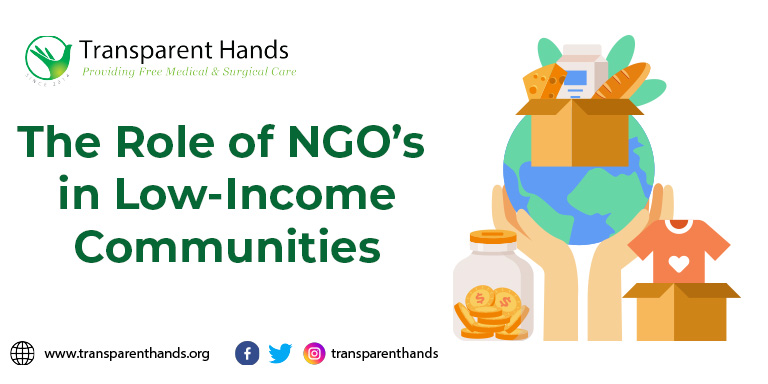The Role of NGOs in Society & Communities with Low Income

The role of NGOs in society is to work on a mission or set of values that guide them, and they can be involved in a wide range of missions, such as advocacy, education, community development, humanitarian aid, and protecting the environment for the betterment of the community. They also serve as a medium between citizens and the government. They are separate from the government and the private sector. They work for social, cultural, and environmental causes that the government or the private sector is not doing enough to help the people with.
In general, an NGO is an organization that operates independently of any government. The term was coined by the United Nations (UN) in 1945 to differentiate between government and private organizations, and it is relatively new. NGOs are typically formed by any individual with a specific mission or service in mind, and they use their platform for non-profit advocacy.
Types of “NGOs”
There are several types of NGOs based on their focus and activities:
- Charitable non-governmental organizations (NGOs): These organizations provide charitable services to marginalized and disadvantaged communities, such as healthcare, education, and social welfare.
- Advocacy NGOs: These organizations work to advocate for specific issues and promote policy changes related to social, economic, and political issues.
- Service-oriented NGOs: These organizations provide specific services such as disaster relief, humanitarian aid, or emergency response.
- Research and policy-oriented NGOs: These organizations conduct research, analysis, and policy development on topics such as public health, human rights, and the environment.
- Community-based non-governmental organizations (NGOs): These are typically small, local organizations that work to improve the quality of life in a specific community or region.
It’s worth noting that NGOs can fit into more than one of these categories, depending on their mission and activities. NGOs have proliferated and expanded their spheres of influence over the past decade. The role of NGOs is not just to work at the grassroots level, they also serve as advisors to governments, international organizations, and even the United Nations.
The role of NGOs is to serve as a medium between citizens and the government. They are separate from the government and the private sector. They work for social, cultural, and environmental causes that the government or the private sector is not doing enough to help the people with.
Role of NGOs in Society
- Advocacy and activism: NGOs work to raise awareness of social, economic, and environmental issues, as well as to advocate for policy changes that benefit the public good. They act as a voice for marginalized communities, promoting human rights and social justice.
- Service delivery: NGOs frequently provide direct services to communities in need, such as healthcare, education, and disaster relief. They work to improve the quality of life for individuals and communities and to fill service gaps.
- Accountability: NGOs monitor the actions of the government and other actors and hold them accountable for their conduct. They work to ensure that policies and practices are in line with citizens’ needs and aspirations and that they promote transparency, accountability, and good governance.
- Capacity Building: NGOs work to strengthen the capacity of individuals, communities, and institutions to address social, economic, and environmental issues. They provide training, resources, and technical assistance to assist in the development of the skills and knowledge necessary for bringing about lasting and sustainable change.
Role of NGOs in Low-Income Communities
Low-income communities often face significant challenges in accessing essential services and opportunities. They may lack the resources and support needed to address clean water and sanitation in communities that lack access to these basic services. The role of NGOs in society is to work for economic stability and financial sustainability by reducing poverty through skill training and providing ways of generating sustainable livelihoods.
Furthermore, NGOs advocate for the rights and interests of low-income communities and seek to include their perspectives in policymaking. This can also mean working for policies that support social justice, human rights, and the long-term growth of a society.
Benefits of NGOs for Low-Income Communities
- Basic Needs: In low-income communities, access to basic services like healthcare, education, and clean water and sanitation is often lacking; NGOs work to address this issue.
- Rights advocacy: NGOs fight for the interests of people living in poverty and work to ensure that they are heard in policy debates that directly affect their daily lives. They are also active in defending human rights and promoting social fairness.
- Community Development: Sustainable development in communities is facilitated by NGOs through the provision of technical assistance and training, capacity building, and resources.
- Emergency Relief: A significant role of NGOs in society is to provide immediate aid in times of disaster and emergency by supplying food, shelter, and medical care to those in need.
- Financial Independence: Non-governmental organizations (NGOs) promote economic empowerment by offering education and tools to help people improve their economic conditions and alleviate poverty.
Endnote
The role of NGOs in society is essential in supporting low-income communities and promoting their overall well-being and development. By addressing societal needs and problems and working toward sustainable and inclusive development, NGOs can help build stronger, more resilient communities and contribute to a more just and fair society.










Leave a Reply